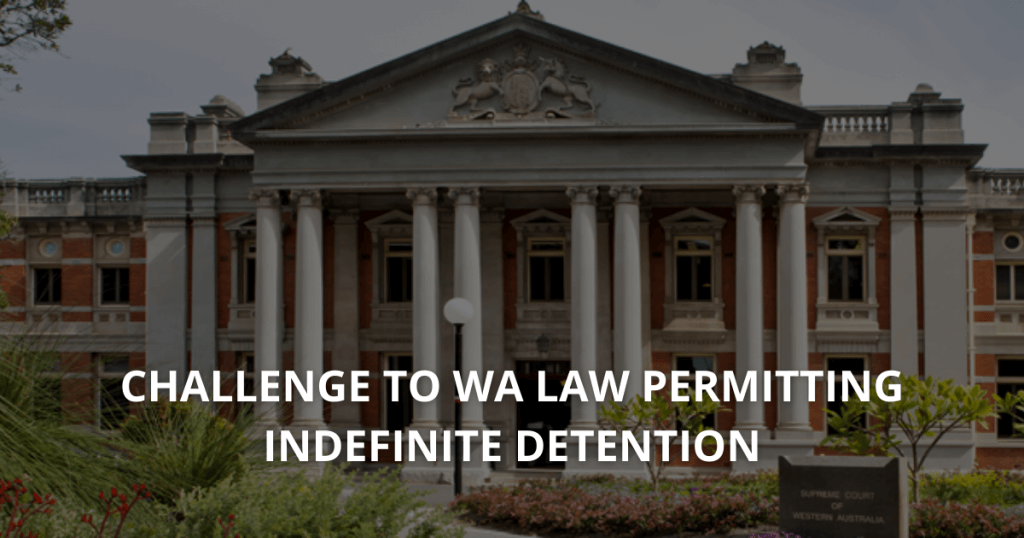A challenge is taking place against a Western Australian law which allows the Supreme Court to keep people behind bars after their prison sentence ends. Aimed at violent offenders, the High Risk Serious Offenders Act WA 2020 allows indefinite detention. Consequently, it has swept up a range of people including those inside for armed robbery.
Challenge to over-reaching law that allows indefinite detention
The court case challenging the law centres around Noongar man Peter Garlett. Garlett served three years and six months prison time for a 2017 aggravated armed robbery.

Despite it being Garlett’s first offence as an adult, under the High Risk Serious Offenders legislation, an assessment will occur as to if he should be in indefinite detention.
Associate Professor at Curtin University Law School Dr Hannah McGlade told the National Indigenous Time that it sets an unusually low bar for indefinite detention.
“It is very shocking and quite wrong, that we would as a society say that people who have committed [robbery] should never be released from prison,” she said.
“There are many other charges [in the legislation] that similarly, you would have to question why they would be considered such a high-risk offender.”
Powers to indefinitely hold offenders
Australia’s legal system operates on the basis that once you complete your court imposed sentence, you are free to re-enter society. The length of your term correlates with the seriousness of your offence with the most severe punishment at a life imprisonment.
Under the High Risk Serious Offenders Act WA 2020 anyone who has committed or attempted to commit a “serious offence” under the legislation is eligible for indefinite detention.
Those “serious offences” include but aren’t limited to:
- lighting or attempting to light fire likely to injure;
- stalking;
- robbery;
- seeking to induce person to act as prostitute;
- dangerous driving causing death or grievous bodily harm;
- and more.
While it is clear that these crimes are serious in nature it does not simply warrant that those offenders deserve imprisonment indefinitely.
Disproportionately affects Indigenous people
Lawyers for Garlett argue that the Act breached the Racial Discrimination Act.
Under the High Risk Serious Offenders Act, the Court is required to consider:
- prior imprisonment,
- convictions and
- social disadvantage
when making a decision about whether to indefinitely detain someone. However, all of these are conditions that disproportionately affect First Nations Peoples. Especially considering the poor outcomes they suffer in prison, including deaths in custody.
“At this point, we want to see the law declared invalid,” Dr McGlade said.
“It is racial discrimination against Aboriginal people who experience higher rates of incarceration, of mental health distress, of poverty, and other factors that will then render them vulnerable to imprisonment. Those factors will be relied upon in risk assessment tools.”
Dr McGlade said she believes the law is unconstitutional.
“It’s a principle of law that a person who receives a sentence must be released after the end of that sentence,” she said.
“While there have been some exceptions made for people who are considered continuing high risk–people who are believed to be risk terrorists or risk child sex offenders–to then extend it to people that they say might be a risk because they’ve committed robbery offences has gone too far.
“It’s against our human rights commitments. It’s a form of cruel and inhumane treatment to say to a prisoner ‘you have no release date’. It’s very, very cruel.”
McGlade said the law’s racially discriminatory aspects also put it at odds with Australia’s UN human rights obligations.
“This is not an optional system that we engage with international law and the UN,” she said.
“It’s quite a shocking law, passed at a time when our government fully understands the imperative of reducing Indigenous incarceration.”
Sarah is a civil solicitor who primarily practices in defamation, intentional torts against police, privacy and harassment.
- Sarah Gorehttps://obriensolicitors.com.au/author/sarahg/
- Sarah Gorehttps://obriensolicitors.com.au/author/sarahg/
- Sarah Gorehttps://obriensolicitors.com.au/author/sarahg/
- Sarah Gorehttps://obriensolicitors.com.au/author/sarahg/





